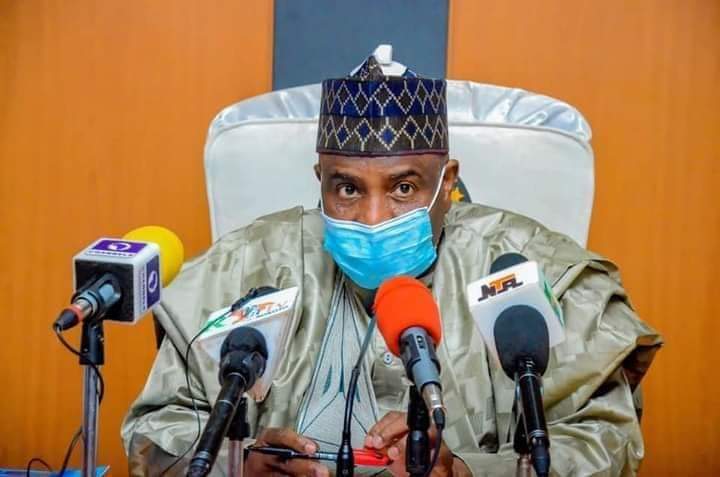News
Tambuwal assures donors of Sokoto’s commitment to improving sanitation, hygiene

Gov Aminu Tambuwal of Sokoto state has reiterated the state’s commitment to partner with the U.S Agency for International Development (USAID) and the United Nations Children Education Funds(UNICEF) on improving sanitation and hygiene in the state.
Tambuwal gave the assurance when he received UNICEF officials and delegates from Kebbi and Zamfara states on courtesy visit on the sidelines of a project inception meeting in Sokoto.
It was reported that the project tagged: “USAID/UNICEF Improving Sanitation, hygiene and Safe Drinking Water in North West Nigeria”, was designed to last up to 2024.
He said his government had ensured the signing of a Memorandum of Understanding (MoUs) on implementing viable projects that would uplift peoples lives and would continue to do so.
Tambuwal expressed his commitment to partner with donor agencies on the renewed efforts at ensuring maximum reduction of indicators on immunisation coverage, mortality rates and other health improvement activities in the state.
He disclosed that Sokoto state had accessed Primary Healthcare Development Funds to revamp 200 Primary Healthcare Centers (PHCs) for health delivery in rural areas, as additional efforts were also underway to cover all the 600 PHCs and dispensaries in the state.
The Governor added that the state had constructed a 950-bed capacity teaching hospital, besides three premier hospitals in geopolitical zones, as well as ensuring that general hospitals were sited in all local government areas and major towns.
He assured of continuous partnership on tackling open defecation, joining the clean Nigeria project, as well as confronting other challenges on water supply, sanitation and hygiene.
Responding, Mr Maulid Warfa, the Chief Field Office of UNICEF in charge of Kano and Sokoto, said that USAID had committed $10 million dollars (N4.1 billion) as support to improve water, hygiene and sanitation activities in Sokoto, Kebbi and Zamfara states.
Warfa said the project, which aimed at building community-centered approaches for delivering, operating and managing sustainable Water, Sanitation and Hygiene (WASH) services in rural areas, was focused on fostering resilience in communities, in partnership with state governments.
He noted that the project planned to put in place needed infrastructure, while supporting community efforts to eliminate open defecation, adopt proper hygiene and improve water quality in the implementing local government areas.
The UNICEF official emphasized that the targeted goals were part of the UN Sustainable Development Goals (SDGs), stressing that WASH was an important component in achieving proper nutritional values, as well as reducing mortality rates.
Also speaking, UNICEF’s Chief of WASH, Jane Bevan, commended the commitments of the respective states and emphasised the need for them to live up to their expectations on funding, as well as coordination.
Bevan outlined the importance of the project activities to be managed by UNICEF that would provide life-saving WASH services to more than 300,000 people in need of assistance.
She said the new activity would help to reduce waterborne diseases, to keep more people, especially children, healthy in the implementing states.
“It will also help rebuild dilapidated infrastructure and support communities to increase access to proper sanitation, adopt proper hygiene behaviors, and improve water quality,” she said.
Earlier, at the project inception meeting, Mr Emmanuel Awe, the Director, Water Quality and Sanitation, in the Federal Ministry of Water Resources, reiterated the Federal Government’s commitment to providing safe drinking water and hygienic environments to promote good health of the citizens.
Awe described the project as timely, in accordance with government efforts to all Nigerians and commended the donor agencies for their support.
NAN reports that representatives of the three states, Sokoto, Kebbi and Zamfara, presented respective action plans to be implemented in the programme.
According to a report, Sokoto and Kebbi states had the lowest levels of access to basic water services at 38 per cent and 39 per cent, respectively, while access to basic sanitation was low in Kebbi, Zamfara and Sokoto at 35 per cent, 38 per cent, and 41 per cent, respectively.
Five per cent of people in Sokoto and one per cent in Kebbi, have access to safely managed water services, the report also said.
It was reported that shortage of clean water supply, toilets, and hand washing facilities in households across Nigeria presented a formidable challenge.
Poor access to WASH services is often cited as the major cause of diarrhoea morbidity and mortality in Nigeria and is associated with at least 70,000 deaths in children under five annually.




 Davido's Net Worth & Lifestyle
Davido's Net Worth & Lifestyle 
